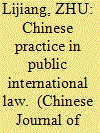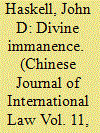|
|
|
Sort Order |
|
|
|
Items / Page
|
|
|
|
|
|
|
| Srl | Item |
| 1 |
ID:
122805


|
|
|
|
|
| Publication |
2012.
|
| Summary/Abstract |
This Survey covers materials reflecting Chinese practice in 2011 relating to: I. Fundamental principles of international law (principles of non-use of force; principle of peaceful settlement of international disputes; principle of non-intervention of internal affairs; rule of law at the national and international levels); II. International law of treaties (reservations to treaties; effects of armed conflicts on treaties); III. Recognition of new states and governments (Republic of South Sudan; Libyan National Transitional Council); IV. State immunity; V. China's territorial integrity (Taiwan; Tibet; China-India border issue; Diaoyu Island and its affiliated islands; Nansha Islands); VI. Polar regions (Antarctic; Arctic); VII. International law of the sea (general position; Chunxiao oil and gas field in East China Sea; South China Sea; China-Vietnam Agreement on Basic Principles Guiding Settlement of Sea Issues; marine environment; marine biodiversity beyond areas of national jurisdiction; sustainable fisheries; Commission on the Limits of the Continental Shelf; International Seabed Authority; International Tribunal for the Law of the Sea; Somalia piracy); VIII. International law on outer space; IX. International human rights law (General position; rights of the child; Human Rights Council; Implementation of human rights instruments); X. International humanitarian law (protection of civilians in armed conflicts); XI. International law on disasters (protection of persons in the event of disasters); XII. International law on arms control, disarmament and non-proliferation (general position; Protocol to the Southeast Asia Nuclear-Weapon-Free Zone Treaty; abandoned Japanese chemical weapons in China; landmines); XIII. International criminal law (International Criminal Court; the Bashir case; Mr. LIU Daqun elected as judge of international residual mechanism for criminal tribunals; UN Special Tribunal for Lebanon; scope and application of universal jurisdiction; immunity of state officials from foreign criminal jurisdiction; measures to eliminate international terrorism; decision on issues concerning strengthening anti-terrorism work; ratification of China-Russia Agreement on Cooperation in Fighting against Terrorism, Separatism and Extremism; UN investigation of war crimes in Sri Lanka; law enforcement cooperation along the Mekong River among China, Laos, Myanmar and Thailand; Bilateral Treaty on Extradition and Treaty on Assistance in Criminal Matters with Italy; transfer of a British suspect of pornographic crimes to the United Kingdom; transnational organized crime; international drug control; international code of conduct for information security); XIV. International environmental law (climate change; joint statement on EU's inclusion of aviation into EU emission trading scheme between China and Russia; effects of atomic radiation; use of water resources of cross-border rivers); XV. International law on international organizations (responsibility of international organizations; role of UN and its reforms; UN financing; UN peacekeeping operations; Mr. HUANG Huikang elected as member of the International Law Commission; establishment of Trilateral Cooperation Secretariat; ratification of the Third Protocol Amending the Treaty of Amity and Cooperation in Southeast Asia); XVI. International law on settlement of disputes (International Court of Justice (ICJ); Ms XUE Hanqin elected as member of the ICJ).
|
|
|
|
|
|
|
|
|
|
|
|
|
|
|
|
| 2 |
ID:
122803


|
|
|
|
|
| Publication |
2012.
|
| Summary/Abstract |
This article examines the mechanism of compliance control of the Landmine Convention (the Ottawa Convention). Its purpose is to elucidate the process of dialogue and persuasion when it deals with compliance issues. The article deals with compliance issues relating to Articles 4 and 5 of the Convention. They provide for the obligation to destroy the stockpiled landmines and the obligation to remove and destroy the landmines in the mined areas, respectively. The study divides cases into two categories: potential non-compliance and actual non-compliance. Case studies of both categories indicate that States engage themselves in a dialogue with the rest of the States Parties, in the form of Meetings of the States Parties, Review Conferences and also in less formal fora. The dialogue leads to a formulation of realistic strategies for compliance with the obligations in question. Case studies indicate the acceptance of such strategies, both by the State Party facing the problem and the rest of the States Parties.
|
|
|
|
|
|
|
|
|
|
|
|
|
|
|
|
| 3 |
ID:
122800


|
|
|
|
|
| Publication |
2012.
|
| Summary/Abstract |
In this article, I hypothesize that against mainstream secularization accounts concerning the 19th-century development of modern international law, especially within the Anglo-American experience, the discipline was significantly influenced by liberal Protestantism. My argument is that a liberal Protestant cultural elite, to which the first generation of international jurists belonged, drew inspiration from the theological doctrine of divine immanence to solidify their socio-political authority against a diverse series of internal and external threats. In an attempt to demonstrate the evangelical foundations of modern international law and the importance played by Anglo-American legal scholars within the tradition, the article is organized into three sections. First, I examine traditional 19th-century narratives of international law, particularly in relation to Christianity. Second, I trace out how the doctrine of divine immanence was formulated in Liberal Protestant theology and how this influenced international legal scholarship within the period in relation to doctrines of the nation-state. Third, I examine how divine immanence shaped three anxieties shared by liberal Protestant theologians and international jurists, including former colonized people and institutions, Roman Catholic beliefs and immigrant populations, and the nascent industrial working-class and radical political ideologies. The article concludes with some brief reflections on the implications of this study and potential directions for future research in the field of religion and international legal history.
|
|
|
|
|
|
|
|
|
|
|
|
|
|
|
|
| 4 |
ID:
122804


|
|
|
|
|
| Publication |
2012.
|
| Summary/Abstract |
This paper gives an overview of the activities of the International Tribunal for the Law of the Sea ("the Tribunal") in 2011. It provides information on organizational matters, the jurisdiction of the Tribunal and cases before it.
|
|
|
|
|
|
|
|
|
|
|
|
|
|
|
|
| 5 |
ID:
122799


|
|
|
|
|
| Publication |
2012.
|
| Summary/Abstract |
Working as both lecturers and researchers within the theory and practice of international law, we are regularly confronted with materials and issues that raise the question of the relationship between this form of legal regulation and the political exercise of sovereign power. In turn, this persistent confrontation raises the question of which type (or types) of analytical perspective is most likely to illuminate how this relationship appears within the East Asian and other geopolitical contexts? For example, have we, as the German law professor Carl Schmitt suggested in the mid-20th century, been entering a new global order comprising multiple and co-existing regional hegemonic bodies, each possessing its own spheres of influence and located at an intermediary level between the United Nations and the traditional individual nation State? In this order of large political spaces, will China's growing status as a regional superpower, projecting its sovereign power and influence well beyond its own national borders, require legal recognition by a modified and realist form of international law and, if so, then in which particular ways?
|
|
|
|
|
|
|
|
|
|
|
|
|
|
|
|
| 6 |
ID:
122801


|
|
|
|
|
| Publication |
2012.
|
| Summary/Abstract |
This brief comment traces and comments on the themes of "One World", Bipolarism, Unilateralism and Multiculturalism in international relations and law since the end of World War Two. The comment criticizes unilateralism and expresses support for a multicultural approach to world affairs.
|
|
|
|
|
|
|
|
|
|
|
|
|
|
|
|
| 7 |
ID:
122802


|
|
|
|
|
| Publication |
2012.
|
| Summary/Abstract |
In April 2012 the Commission on the Limits of the Continental Shelf (CLCS) adopted certain decisions and recommendations regarding Japan's 2008 outer continental shelf submission. The Japanese and Chinese differing interpretations of these recommendations demonstrate the still controversial legal status of Oki-no-Tori Shima under Article 121(3) of the United Nations Convention on the Law of the Sea (UNCLOS). Such a contradiction enlarges another dispute on the legal status of the surrounding maritime zone proclaimed by Japan as its Exclusive Economic Zone (EEZ). This article examines the decisions and recommendations of the CLCS as well as Japan's Submission so as to clarify the confusing situation. The decisions by the CLCS have wider implications on the unsettled scope of disputes under Rule 46 of and Annex I to the Rules of Procedure (ROP) of the CLCS, affecting submissions by other States. These implications will be explored by this article. Finally, the author offers his views on the future of such confrontational situations.
|
|
|
|
|
|
|
|
|
|
|
|
|
|
|
|
|
|
|
|
|